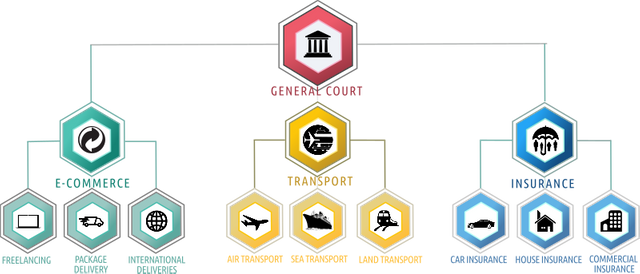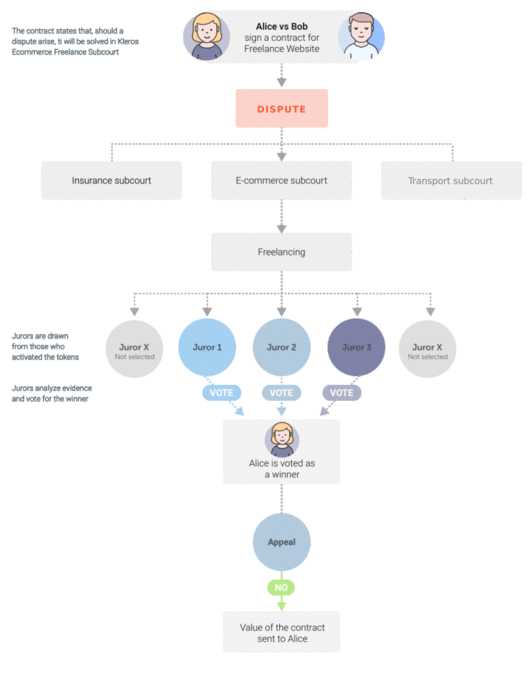KLEROS. THE MOST NEEDED CONFLICT RESOLUTION PLATFORM FOR CRYPTO'S WILD WEST

The crypto market madness has been undoubtedly one of the factor that produced the hype around the new digital asset trend. Crypto has given us the opportunity to build a truly free, unconstrained, and democratic economy. But this limitless freedom has also opened the door to thousands of scammers who try to exploit the structure of a new system that is just giving its firsts baby steps.
We are building a new decentralized paradigm that will connect hundreds of millions of people, and since we don't have a hierarchal structure, dispute resolution is a major concern.
Smart Contracts addresses the issue by automatically executing a code with pre-established conditions, but since their code can't be upgraded or actualized, they lack the flexibility needed to solve problems that arise due to the ever-changing conditions of the crypto ecosystem.Crypto needs a system that offers protection to its users from scammers in order to achieve mass adoption. Big investors would not pour resources into a leaking vessel. Kleros' team has come with an innovative solution to create a dispute resolution platform that will allow court-like services into the crypto ecosystem. Kleros DApp is built on top of Ethereum and functions as a decentralized third party to arbitrate disputes in a fast, inexpensive, reliable, and decentralized way.
Kleros uses a fundamental insight from legal epistemology to create an automated decision protocol for a multipurpose court system.

Schellin Coin. Vitalik's attemp to bring order

In the Schelling Coin mechanism, honesty is desired to become a Schelling Point through economic incentives. Therefore, this honesty-prove protocol is tested through a secret ballot, after everybody has voted the results are revealed. Each party whose vote is aligned with the majority receive 10% of their coins and each party whose vote is incoherent will lose 10% of their coins.
The scheme of the Schelling Coin is such that parties which do not know or trust each other are incentivized to behave coherently due to the revenue gained by choosing the honest answer. This kind of protocols allows for providing Blockchain services, such as the Oracles needed to execute some Smart Contracts. Kleros backbone functions in a similar way, the major changes are done to address scalability, privacy, and subjectivity.

How Kleros design actually works
Arbitrated Contracts

Source: Klero's Whitepaper page 3
Kleros provides an opt-in court platform for controversy resolution. Parties have to create a smart contract in which they select Kleros as their arbitrator. When they create the smart contracts, parties should select a specialized court to rule their contract in case a dispute occurs. Also, the contract will specify the options available for jurors to vote and the behavior of the contract after the ruling is done.
Kleros designs wisely protect jurors and parties privacy, natural language clauses and the label of the jurying voting options are not stored directly in the blockchain to prevent outside observers from accessing this information. When someone creates a contract, the creator submits hash (contract_text -the plain text of the contract, option_list -the labels of the options that can be voted by jurors, salt -a random number to prevent decryption tools usage such as rainbow tables). Also, asymmetric encryption is used by the contract creator to provide {contract_text, label_list, salt} to parties and jurors and the correctness of the submitted hash can be verified. This features will be handled with ease by the application.

Jurors selection
Kleros selection mechanism is based in token economic logic. Jurors are incentivized by the arbitration fees to solve dispute resolution requests, but for being eligible they have to deposit Pinakion (PNK) tokens, the greater the quantity deposited the greater the chances of being selected by the system. This prevents malicious users from creating multiple accounts and launch a Sybil Attack on the platform. Also, PNK is used to incentivize jurors to well behave by making incoherent jurors to pay part of their deposit to coherent ones.
After jurors self-select specific courts and deposit their tokens, the selection is randomly carried out by the Kleros' protocol. The more tokens a juror deposit the greater the chance of being selected. Even more, although it is unlikely, a juror may be chosen more than once, the number of times the juror is selected is called the juror's weight. This determines the numbers of votes he will get during the dispute and proportion of his earns and loses at the end of the dispute resolution process.
This step has a final ledger of security, the random number generation algorithm. Random numbers are generated with sequential proof of work. This protects random number generation seeds from malicious attacks due to the already attack resistant cryptographic hash functions. This protocol is designed to work in PoS-based blockchains aswell (More technical details can be found in Kleros whitepaper: page 6).

Voting mechanism
After the evidence is considered by jurors, they commit their vote to one of the options, they submit hash (vote, salt, ETH address). When the voting is over, jurors reveal {vote, salt} and a Kleros' Smart Contract verifies that this matches juror's commitment. Here is where the mechanism gets interesting:
- Jurors who fail to reveal their vote will lose PNK.
- After a commitment is made, the vote cannot be changed and it remains invisible for other jurors. This prevents jurors to synchronize their voting pattern, thus they almost all the time will vote for the Schelling Point
- Jurors who try to influence the result by revealing only their voting will have no means to prove that they actually have committed that way. Even more, if any party is able to reveal the commitment of a juror before the voting is closed, all the juror's Pinakions can be taken by that party. Theses fully disincentive jurors from revealing their commitment
- An explanation for their vote is also required from each juror
- After all jurors vote, each of them must reveal their vote (again a juror who fails to do this is penalized) and the votes are added and the correct clause of the Smart Contract is executed

Source: Kleros Whitepaper page 14

Arbitration fees
Arbitrations fees serve as a mechanism to incentivize jurors to participate in the dispute resolution, and to protect the system from users to try to spam endless arbitration or appealing requests. The payment for each juror will be determined for the specific each sub-court. The arbitrable smart contract will determine which party should pay the fee.
Rules can be set with enough complexity to address all kind of situations. For example, in appeals, the appellant has to deposit an extra stake proportional to the appeal fees. If the appellant is right all the deposit will be reimbursed to him, but if he is just making senseless claims to damage the other party, the system will make a compensation for the other party time loss.

Appeals
When a party is not satisfied with the outcome of a dispute, he can appeal the decision and have the dispute ruled again. Each new instance will have twice +1 jurors than the previous one, and the fees will increase proportionally. Jurors on the appealed level will not be paid, thus they are incentivized to provide convincing explanations of their ruling. The more convincing the explanation is, the lesser the chance for a party to appeal the decision.

Incentive mechanism
The maths for the incentive mechanism are quite straightforward:
- Ammount of tokens lost per incoherent juror:
α*min_activate*weight
The α parameter is an endogenous variable that is established by the governance mechanism, it determines the number of tokens that will be distributed after a ruling. The min_activate is the minimum amount of tokens that can be activated in each sub-court - The penalties for jurors who fail to reveal their vote will be twice as large as the penalty for voting incoherently
2*α*min_activate*weight
The following figure illustrates one example of an instance ruled by seven jurors, PNKs are distributed from jurors who voted incoherently to jurors who vote coherently. Also in this example, Bob lost the dispute and pays the arbitration fee.

Attack resistances
There are two major concerns for the system, the first is that one party ends up having half of the tokens (or multiple parties colluding). This will be prevented with the increasing marginal costs of buying large quantities of PNK tokens due to the increase in the market price. The other concern is bribing, again jurors holding 50% or more of the PNK token should accept the bribe, but as the PNK token value will deeply diminish if such an attack occurs, jurors will have more revenue if the platform functions correctly.

Governance mechanism
Users will be able to upgrade Kleros' platform using a liquid voting mechanism. Token holders will have a number of votes equal to the amount of PNK that they hold. Also, they will have the option to vote directly or delegate their vote.
Governance mechanism will be used to state sub-courts' policies, add new sub-courts, remove sub-courts, modify the sub-court hierarchy. Also, sub-court parameters such as arbitration fees, time of each session and minimum amount of tokens activation will be set by this mechanism.

Final Considerations
Steemit community use case for Kleros' platform
In Steemit we have many cases of plagiarism and abuse, the overall ecosystem is plagued with users that start senseless disputes and flag wars. We have tried to correct this by delegating the responsibility to some users, such as the community of steemcleaners and the user who runs the cheetah bot. But there are many cases of mislead judging from these moderators, and the appeal protocols are not clear or transparent since most of them happen on Discord.
Users running these services could use a sub-court Kleros' for author rights dispute resolutions, and for users behavior fair judging. This will dramatically increase the quality of each steemian experience on the platform and will free our beloved ecosystem from spammers and bullies.

Aditional information about Kleros' project
Kleros team, advisors and partners

Image made using the Kleros logo from this page
Check out this demo of the platform

Kleros Social Media
- Kleros Website
- Kleros WhitePaper
- Kleros Github
- Kleros Twitter
- Kleros Youtube
- Kleros Facebook
- Kleros Telegram
- Kleros Medium
- Kleros Forum
- Kleros Reddit
- Kleros Linkedin
Here is my tweet about Kleros: https://twitter.com/JoelASegoviaB/status/1032072091363954689
This is my entry for @originalworks contest
klerostwitter
kleros2018









You just received a 8.14% upvote from @honestbot, courtesy of @joelsegovia!

This post has been submitted for the @OriginalWorks Sponsored Writing Contest!
You can also follow @contestbot to be notified of future contests!
Congratulations! This post has been upvoted from the communal account, @minnowsupport, by joelsegovia from the Minnow Support Project. It's a witness project run by aggroed, ausbitbank, teamsteem, someguy123, neoxian, followbtcnews, and netuoso. The goal is to help Steemit grow by supporting Minnows. Please find us at the Peace, Abundance, and Liberty Network (PALnet) Discord Channel. It's a completely public and open space to all members of the Steemit community who voluntarily choose to be there.
If you would like to delegate to the Minnow Support Project you can do so by clicking on the following links: 50SP, 100SP, 250SP, 500SP, 1000SP, 5000SP.
Be sure to leave at least 50SP undelegated on your account.
Limited Promotion! Use both @t50 and @hybridbot for a chance of receiving extra upvotes!
You got a 24.60% upvote from @t50 courtesy of @joelsegovia!
Anyone can use this service by sending a minimum of 0.010 SBD or STEEM to @t50 with the post you want upvoted as the memo.
Consider investing Steem Power to receive daily payouts from bot income.
10 SP, 25 SP, 50 SP, 75 SP, 100 SP, 125 SP, 150 SP, 200 SP, 250 SP, 300 SP, 350 SP, 400 SP, 450 SP, 500 SP, 600 SP, 700 SP, 800 SP, 900 SP, 1000 SP or use the delegation manager. At any time you can get your investment back by undelegating.
Partners
@upfundme and #upfundme
TASKMANAGER bitshares token
@hybridbot - bid/membership hybrid bot (0.010 SBD minimum)
@memearmy meme support community bot
You got a 3.43% upvote from @postpromoter courtesy of @joelsegovia!
Want to promote your posts too? Check out the Steem Bot Tracker website for more info. If you would like to support the development of @postpromoter and the bot tracker please vote for @yabapmatt for witness!
You got a 6.98% upvote from @upme thanks to @joelsegovia! Send at least 3 SBD or 3 STEEM to get upvote for next round. Delegate STEEM POWER and start earning 100% daily payouts ( no commission ).
You got a 24.22% upvote from @cabbage-dealer courtesy of @joelsegovia!
Delegate today and earn a 100% share of daily rewards!
BOING! You got a 4.65% upvote from @boinger courtesy of @joelsegovia!
Earn daily payouts by delegating to Boinger! We pay out 100% of STEEM/SBD!
You got a 47.62% upvote from @peace-bot courtesy of @joelsegovia!
Help spread the peace. Want to promote your posts too? Send a minimum of .02 SBD or STEEM to @peace-bot with link in the memo for an upvote on your post. You can also delegate to the bot for daily passive earnings. If you would like to delegate to the Peace Bot you can do so by clicking on the following links:
50SP 100SP 250SP 500SP 1000SP 5000SP
Learn more!
They have enlisted the help of the @alliedforces!
We gladly answer your call!
(@alliedforces is a collaboration of witnesses @jatinhota & @enginewitty)
Have you supported your favorite witnesses?